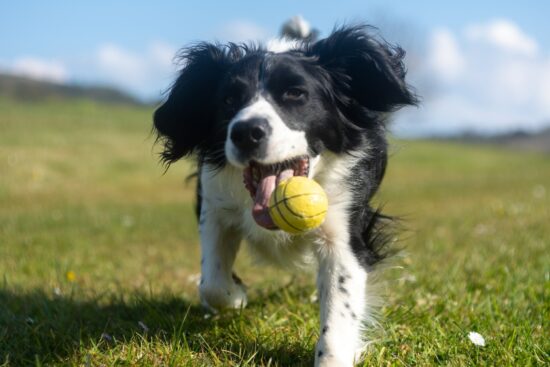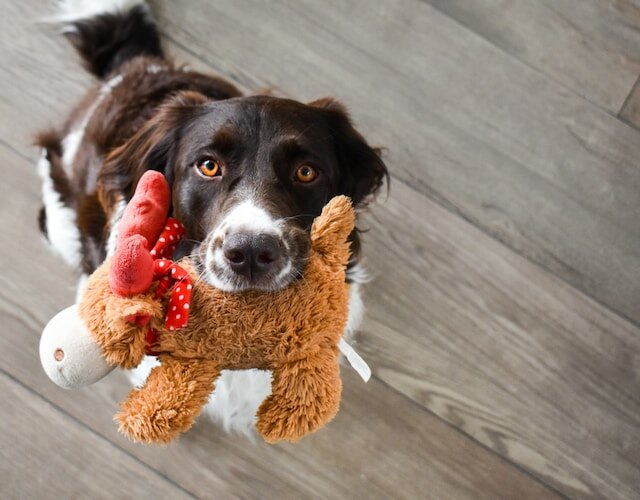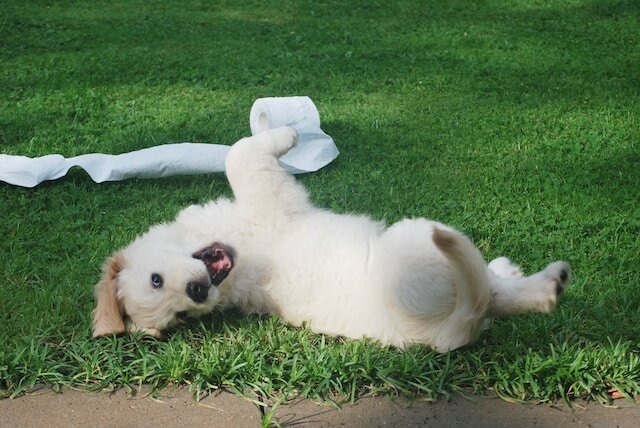
Dogs and puppies need to keep their brains active as well as their bodies. From puppyhood to their senior years, dogs thrive on mental challenges, and it’s up to us to make sure they have plenty of enrichment activities.
In this article, we take a look at the biology behind this adorable love of play, as well as coming up with some fun ways to mentally stimulate your dog or puppy. Thinking up these new challenges will stimulate your brain, too!
Why is mental stimulation important for dogs?
Dog trainer Steve Mann talks about how dogs not only enjoy mental stimulation, they need it for their wellbeing. Dogs, Steve explains, have been bred for years to carry out certain tasks, from hunting to herding. Because these skills have become innate, dogs need to exercise their brains as well as their bodies to stay happy and healthy.
Without enrichment in their lives, dogs can too easily become “professional couch potatoes: overfed but undernourished”. Finding fun ways to mentally stimulate your dog is great fun for you as well as them, and it will certainly help strengthen your bond.
Once you understand what your pooch’s innate behaviours are, you can come up with all sorts of fun games that they’ll find stimulating. Work with these natural skills, and they’ll enjoy play time even more. This should also cut down on less desirable behaviours (running off with the remote control or attempting to herd the kids) as their instincts are being met.
Steve shares the wise words of a dog trainer he once met:
If it’s in the dog, it will come out of the dog.
Don’t suppress your dog’s innate drives. Work with them, and you’ll both be a lot happier.
How much mental stimulation does a dog need?

Most dogs need at least 20 minutes of mental stimulation a day, which can sometimes be broken into two shorter sessions. If you have a senior dog or if your pooch is recovering from an op, they may need a bit more enrichment because they won’t be off exploring the great outdoors as much. Many of the mental activities we’ll suggest in a moment are suitable for indoor and older dogs.
Different types of dogs need different amounts of mental stimulation, depending on what breed they are. For example, an inquisitive poodle will need a lot of enrichment activities, because they’re super-bright and love to be challenged.
The best ways to mentally stimulate a dog also varies between breeds. If you can design activities that match their innate skills and behaviours. Your dog will love their bespoke entertainment programme.
Dogs bred to herd, such as border collies, like games that involve “sorting” activities. Labradors love holding things in their mouths, so are really responsive to searching games like fetch. This has the added benefit of preventing your dog from moving your slippers, mobile phone, house keys etc into random places, as this need is being met through controlled play.
Like Labs, pointers also enjoy searching for things because they’re such champion sniffers, while whippets have a chase-and-grab instinct that makes tugging games great fun. It’s too easy with a super-fit dog like a whippet or greyhound to assume their needs are being met by long walks and runs across the beach. This really isn’t the case, as these intelligent and sensitive breeds need a good mental work-out, too.
When you’re thinking about new ways to mentally stimulate your dog, take some time to research the breed, then you’ll know how much time they need on enrichment activities each day.
5 mental activities for dogs
Here are a few ideas for enrichment activities for dogs, which work with your dog’s natural behaviours and are great fun to try.
1. Food-based enrichment
Food is an excellent motivator for most dogs, and enrichment games that involve searching out food stimulate their scavenger instincts.
Puzzle feeders are a popular choice, and can even become part of their daily feeding routine. Steve has a cheap and easy version you can try. Hide a few treats inside some scrunched up newspaper, and watch as your dog dissects the paper to find the food. Again, this is tapping into their innate behaviours, and they’ll be so happy when they find their reward.
2. Scent games
Your dog doesn’t have to be one of the scent hound breeds to love sniffing things out. Most dogs will find a snuffle mat really exciting. Bury treats inside the deep pile of these special mats for your dog to find. They’ll love the chance to use their sniffing skills.
You can also introduce scent games to your garden or daily walk. Find a safe and large space, free from other dogs. Throw treats around as if you’re feeding the birds, and your dog will have the time of their lives trying to find them all.
3. Stimulating environments
Different scents, textures, sights and sounds are super-stimulating for your dog. If you can, vary your walking routes so your pet experiences different environments, and even a senior dog will appreciate a change of scene from time to time.
Woods, beaches, streams and fields are all perfect places to explore. A large open space is also a good opportunity to try some scatter feeding with your dog. It’s easy to get stuck in a rut with your walking routes, and that’s perfectly understandable in our busy lives. However, when you get the chance, pop your pet into the car and explore somewhere new together.
4. Playing with dog toys
Toys are one of the easiest ways to mentally stimulate your dog, and a simple chew will give them hours of enjoyment. Chewy toys have the added bonus of being really good for their teeth.
Rotate the toys to keep play interesting. (NB: this is only possible if your dog doesn’t rip up their toys. If they do this, don’t worry: it’s an expensive but natural habit. Just watch out for small parts.) If you’re thinking of widening your dog’s vocabulary (most dogs can learn over 100 words), games that involve naming toys provide intelligent dogs with Mensa-level stimulation.
5. Doggie days out with a difference
If you have the opportunity, there are some fantastic mental activities for dogs that you can try, which often combine brainwork with exercise. You can find agility classes in most parts of the country, or join a local dog walking group so your pooch can hang out with their canine peers.
Other activities are less easy to sniff out but great fun when you find them. Look out for dog yoga classes, dog swimming pool sessions and dog birthday parties. These are also great places for the humans to enjoy their own innate behaviour of meeting like-minded humans.
How to mentally stimulate your puppy

Puppies need different stimulation to adult dogs, and plenty of it. If you’re sitting at home with a new puppy right now, surveying the chaos in your once-ordered living room, you might be asking yourself why on earth you’d want to stimulate a puppy even more? That’s understandable. However, this is all about directed mental stimulation, which helps your puppy learn more about this exciting new world while teaching good behaviour and socialisation.
Like grown-up dogs, puppies have innate skills, and will simply be happy if they’re allowed to develop these. So, young German shepherds love to sort things out and little lurchers will enjoy playing tug-of-war with a towel. Social stimulation is also great for young pups, which is why puppy classes and puppy parties are such an excellent idea.
Try these types of mental exercise for puppies.
- Making friends. Most dogs are naturally sociable so your young puppy will enjoy getting together with other pups (and their humans). It’s also a great way to work on their socialisation.
- Puppy classes. Look out for local groups to join, where your puppy will have a fantastic time learning through play and developing their socialisation skills.
- Puzzle games. Try scaled-down versions of the sniffing and searching games we mentioned earlier. Just watch out that they’re not too challenging and make sure that the treats are easy to find, or the games will become frustrating or boring for your pup.
- Exploring new environments. Life is one great big exploration for your young puppy. Safely introduce them to new and different places, keeping an eye out for signs that they’re getting a bit overwhelmed. A young dog’s first sight of the sea is really something to behold.
If you don’t provide enough stimulation for your puppy, they’ll find their own entertainment (see picture). For the sake of your possessions as well as your pup, make sure that they have plenty of enrichment activities built into their day.
Enrichment is so important for your dog or puppy’s health and happiness. Do you want to learn the best ways to mentally stimulate a dog, along with lots of other wellbeing and training tips? Check out Steve Mann’s online dog training course. You’ll find plenty of ways to stimulate your clever dog’s brain and keep them mentally agile.

Give the gift of knowledge
Surprise a special someone with a year's access to BBC Maestro or gift them a single course.





